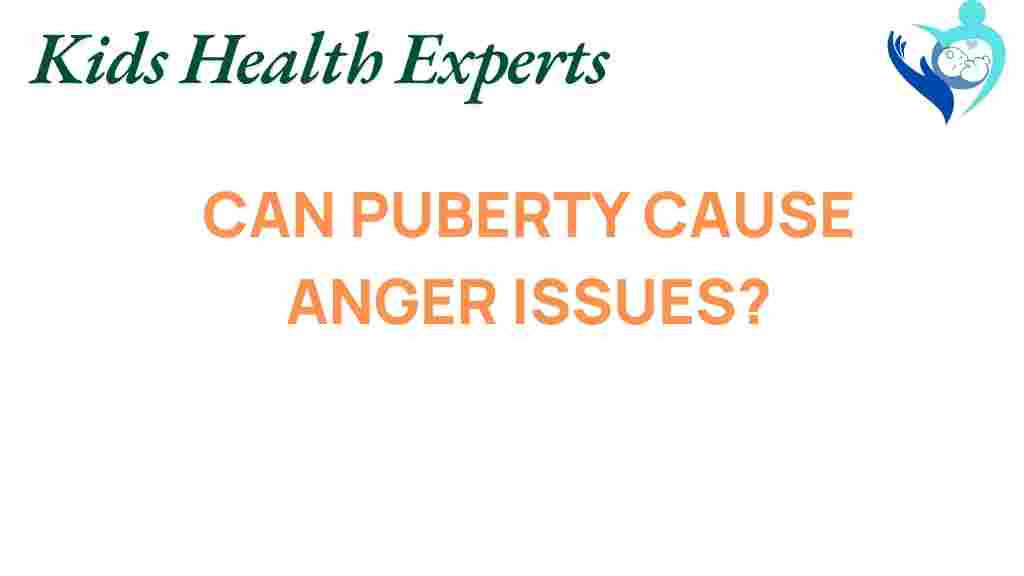Unraveling the Mystery: Can Puberty Trigger Anger Issues?
Adolescence is a critical period of development, marked by significant physical, emotional, and psychological changes. Among these changes, puberty plays a pivotal role, especially in shaping teenage behavior. As young individuals navigate through this transformative phase, they often experience heightened emotions, including anger. This article aims to explore the connection between puberty and anger issues, examining how hormonal changes affect emotional regulation and mental health during adolescence.
Understanding Puberty and Its Impact on Emotional Development
Puberty is the time in life when a child’s body matures into an adult body, capable of sexual reproduction. This stage typically begins between ages 9 and 14 for girls and 10 to 15 for boys. However, the onset and duration of puberty can vary widely among individuals. During this period, adolescents undergo significant hormonal changes that influence both physical and emotional development.
The Role of Hormonal Changes
Hormones such as estrogen and testosterone surge during puberty, leading to various physical and emotional changes. These hormonal fluctuations can greatly affect mood and behavior. For instance:
- Estrogen: Predominantly found in females, it can heighten emotional sensitivity and vulnerability.
- Testosterone: More prevalent in males, it is linked to increased aggression and risk-taking behaviors.
These hormonal changes can lead to difficulties in emotional regulation, fostering environments where anger issues may arise more frequently. Understanding this connection is crucial for parents and educators who aim to support adolescents during this challenging time.
How Puberty Contributes to Anger Issues
During puberty, many teenagers experience anger issues as a result of various interconnected factors. Here are some ways puberty can contribute to these emotional challenges:
1. Emotional Turmoil
Adolescents are often caught in a whirlwind of emotions, from joy to sadness, and anger can be a common reaction to stressors. This emotional turmoil can stem from:
- Changes in peer relationships
- Increased academic pressures
- Body image concerns
2. Development of Identity
Adolescence is a time for self-discovery and identity formation. As teenagers explore their identities, they may face conflicts with authority figures and peers, leading to frustration and anger. This struggle can manifest in:
- Defiance against parental rules
- Struggles with self-esteem
- Isolation or feelings of inadequacy
3. Social Dynamics
The social environment during adolescence can be tumultuous. Teenagers may experience bullying, peer pressure, or exclusion, which can trigger feelings of anger. The need for acceptance can lead to:
- Aggressive behavior towards others
- Emotional outbursts when feeling rejected
- Increased sensitivity to perceived slights
4. Lack of Emotional Regulation Skills
As adolescents navigate their emotions, they often lack the skills necessary for effective emotional regulation. This can result in:
- Difficulty managing anger
- Inability to express emotions constructively
- Resorting to aggressive behaviors as a coping mechanism
Signs of Anger Issues During Adolescence
Recognizing the signs of anger issues in teenagers is crucial for timely intervention. Some common indicators include:
- Frequent outbursts: Sudden and intense expressions of anger can be a red flag.
- Physical aggression: Hitting, pushing, or throwing objects may indicate deeper emotional problems.
- Withdrawal: Isolating oneself or avoiding social interactions can signal emotional distress.
- Substance abuse: Using drugs or alcohol as a means to cope with anger or emotional pain.
Step-by-Step Process for Managing Anger Issues in Adolescents
Parents and caregivers can play a vital role in helping teenagers manage anger issues. Here’s a step-by-step process to guide them:
Step 1: Open Communication
Encourage open dialogue about feelings and emotions. Let your teenager know that it’s okay to express their anger and frustration. Active listening is crucial in this step:
- Validate their feelings.
- Ask open-ended questions to encourage sharing.
- Avoid judgment or criticism.
Step 2: Identify Triggers
Help your teenager identify what specifically triggers their anger. This could include:
- Specific situations at school or home.
- Interactions with peers or family members.
- Stress from academic responsibilities.
Step 3: Teach Emotional Regulation Techniques
Introduce techniques that can help your teenager manage their emotions effectively:
- Deep Breathing: Encourage them to take deep breaths when they feel anger rising.
- Mindfulness: Teach mindfulness practices to help them stay grounded.
- Journaling: Encourage writing about feelings as a form of emotional release.
Step 4: Role-Playing Scenarios
Engage in role-playing exercises to practice responding to anger-inducing situations. This can help your teenager develop better coping strategies in real life.
Step 5: Seek Professional Help
If anger issues persist or escalate, consider seeking help from a mental health professional. Therapy can provide:
- A safe space to explore feelings.
- Tools for emotional regulation.
- Support for underlying mental health issues.
Troubleshooting Tips for Parents
Managing anger issues in teenagers can be challenging. Here are some troubleshooting tips for parents:
- Stay Calm: Maintain your composure during conflicts. Your calmness can positively influence your teenager.
- Set Boundaries: Establish clear rules about acceptable behavior when expressing anger.
- Model Healthy Behavior: Demonstrate effective emotional regulation in your own life.
Conclusion
Puberty is a complex time in life that brings about numerous changes, including emotional development and potential anger issues. Understanding the link between puberty and anger can empower parents, educators, and teenagers to navigate this challenging phase more effectively. By fostering open communication, identifying triggers, and teaching emotional regulation skills, we can help adolescents manage their emotions, ultimately supporting their mental health and well-being.
For more information on emotional development during adolescence, consider visiting this resource. If you’re looking for professional support, don’t hesitate to reach out to a mental health expert.
In summary, while puberty can indeed trigger anger issues, with the right tools and support, adolescents can learn to regulate their emotions and develop healthier coping mechanisms.
This article is in the category Mental and created by KidsHealthExperts Team
